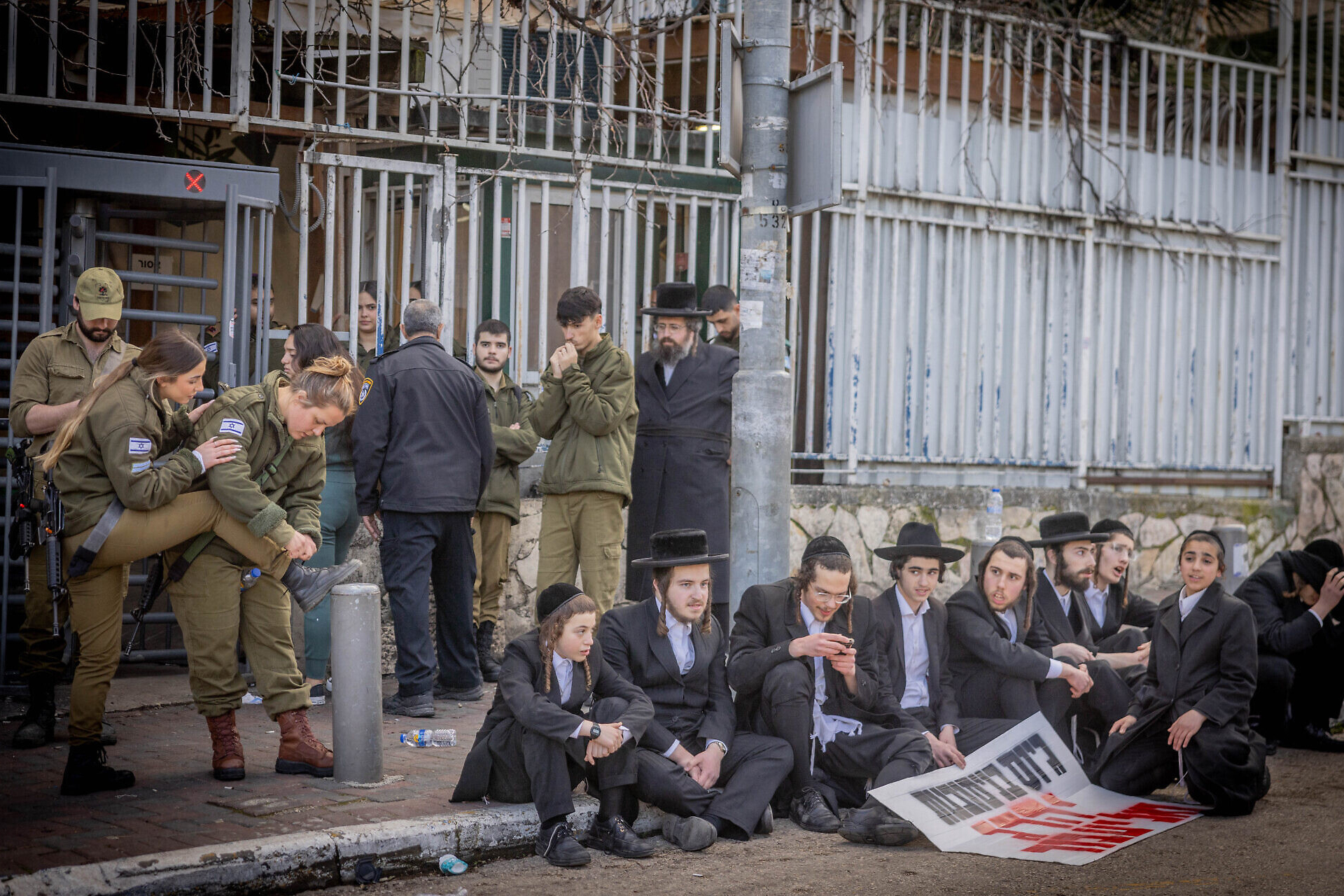Haredim during a demonstration in front of an Israeli army recruitment office (Chaim Goldberg)
Over the past few days, the issue of recruiting religious Jews into the Israeli army has come to the fore, especially with the continuation of the war on Gaza and the occupation army’s need for about 20,000 additional soldiers.
The issue of exempting religious people known as “Haredim” goes back to the first days of the establishment of the State of Israel on the lands of Palestine with British support in 1948, when David Ben-Gurion exempted about 400 students from military service so that they could devote themselves to religious study.
But the Supreme Court in Israel decided to cancel a law issued in 2015 that exempted the Haredim from military service, and considered that it violates the “principle of equality.”
Since 2017, successive governments have failed to reach a consensus law regarding Haredi recruitment, until the matter has returned to the forefront these days. What is the story? What impact will it have on Prime Minister Benjamin Netanyahu and his government?
The origin of the dispute
The exemption for religious Jews, referred to as Haredim, dates back to the early days of the State of Israel in 1948 when David Ben-Gurion, who was the first Prime Minister, exempted about 400 students from military service so that they could devote themselves to religious study.
According to Reuters news agency, Ben-Gurion hoped through this to keep Jewish knowledge and traditions alive after they were almost erased during what was known as the “Nazi Holocaust.”
Since then, the exemptions have become an increasing nuisance as the fast-growing community expands to make up more than 13% of Israel's population, and is expected to rise to about a third of the population within 40 years due to the high rate of population growth among them.
Haredi opposition to joining the army is based on their strong sense of religious identity, a feeling that many families fear will be weakened by service in the army.
Some Haredi men perform military service, but most do not, something many secular Israelis feel exacerbates social divisions.
Many Haredim do not work to earn money, but live on donations, government benefits, and the wages of their wives, many of whom often work for low wages. The Haredim mostly live in neighborhoods with a predominantly religious population and devote their lives to studying religion.
For secular Israelis who are obligated to serve in the army and whose taxes help support the Haredim, the exemptions have long been a source of resentment. This dissatisfaction increased in the six months after the outbreak of war in Gaza.
According to Reuters, many Israelis view the war on Hamas as an existential battle for the future. About 300,000 reserve forces joined the fighting. Opinion polls indicate that there is very broad popular support for abolishing the Haredi’s exemption from conscription.
One of the Haredim protesting against a new draft law on conscription (Associated Press)
current situation
Ultra-Orthodox parties oppose pressure to cancel exemptions granted to yeshiva students from military service, at a time when Prime Minister Benjamin Netanyahu is struggling to maintain the cohesion of the government coalition and divide the burdens of war fairly among the segments of society.
As the government's March 31 deadline to draft legislation to resolve a decades-long dispute over this issue approached, Netanyahu submitted a last-minute request to the Supreme Court to extend the deadline by 30 days.
In an apparent containment of the issue, the Supreme Court gave government officials until April 30 to submit additional arguments. However, in a temporary ruling, the court also ruled to suspend government support granted to students of religious institutions who are suitable for recruitment, starting next Monday.
What are the risks of this for Netanyahu and his government?
For Netanyahu, the risks are high. Although public opinion seems to support repealing the exemption, his government includes two religious parties whose withdrawal from the coalition could lead to new elections that opinion polls indicate that Netanyahu will lose.
Two days ago, the two parties, United Torah Judaism and Shas, denounced the recent ruling issued by the Supreme Court and pledged to fight it, but they have not yet explicitly threatened to withdraw from the government.
On the other hand, Defense Minister Yoav Gallant's allies, including centrist Benny Gantz, want more Israelis to perform military service to share the burden more broadly. Note that Gantz is a former army general and is in pole position to become prime minister if elections are held.
Gallant recently said that any new conscription law would need the support of all parties, indicating that he would oppose any legislation that maintains the exemption.
Source: Al Jazeera + agencies

